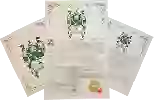
Winery Lamblin & FilsCôtes du Rhône Réserve
This wine generally goes well with beef, game (deer, venison) or lamb.
Food and wine pairings with Côtes du Rhône Réserve
Pairings that work perfectly with Côtes du Rhône Réserve
Original food and wine pairings with Côtes du Rhône Réserve
The Côtes du Rhône Réserve of Winery Lamblin & Fils matches generally quite well with dishes of beef, lamb or game (deer, venison) such as recipes of wild boar with honey, lamb in a crown with spring vegetables or wild boar ragout with kriek.
Details and technical informations about Winery Lamblin & Fils's Côtes du Rhône Réserve.
Discover the grape variety: Mourvèdre
Mourvèdre noir is a grape variety originating from Spain. It produces a variety of grape specially used for wine making. It is rare to find this grape to eat on our tables. This variety of grape is characterized by medium to large bunches, and grapes of medium size. Mourvèdre noir can be found in several vineyards: South-West, Cognac, Bordeaux, Provence & Corsica, Rhône valley, Languedoc & Roussillon, Loire valley, Savoie & Bugey, Beaujolais.
Informations about the Winery Lamblin & Fils
The Winery Lamblin & Fils is one of of the world's great estates. It offers 79 wines for sale in the of Côtes-du-Rhône to come and discover on site or to buy online.
The wine region of Côtes-du-Rhône
The wine region of Côtes-du-Rhône is located in the region of Rhône méridional of Rhone Valley of France. Wineries and vineyards like the Château de Beaucastel or the Chateau de Fonsalette produce mainly wines red, white and pink. The most planted grape varieties in the region of Côtes-du-Rhône are Mourvèdre, Viognier and Marsanne, they are then used in wines in blends or as a single variety. On the nose of Côtes-du-Rhône often reveals types of flavors of pineapple, red plum or sour cherry and sometimes also flavors of truffle, juniper or clove.
The wine region of Rhone Valley
The Rhone Valley is a key wine-producing region in Southeastern France. It follows the North-south course of the Rhône for nearly 240 km, from Lyon to the Rhône delta (Bouches-du-Rhône), near the Mediterranean coast. The Length of the valley means that Rhône wines are the product of a wide variety of soil types and mesoclimates. The viticultural areas of the region cover such a distance that there is a widely accepted division between its northern and southern parts.
The word of the wine: N-M
Negociant-manipulant. Company that buys grapes, sometimes in addition to its own vineyard, elaborates and markets its champagne. Most of the big brands like Moët or Taittinger are N-M.














